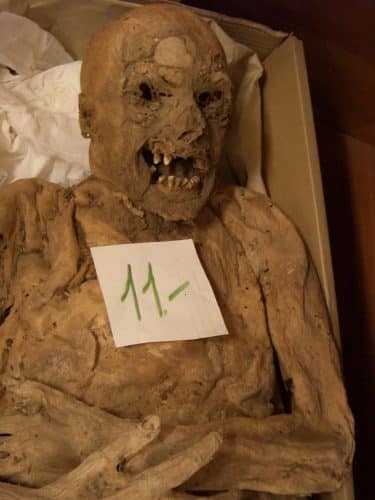The researchers tried to answer the question of whether colon cancer is a product of the modern lifestyle or whether it was common hundreds of years ago * The study was published this month (February) in the journal PLOS ONE

Cancer in general, and colon cancer in particular, are among the leading causes of death of our time. Many believe that the modern lifestyle, the food we consume, climate change and more are responsible for the large increase in the incidence of the disease in recent decades. Researchers from the Tel Aviv University School of Medicine tried to find out if ancient populations, who lived in a completely different environment, also carried genetic mutations that increase the tendency to get the disease, and if so, are they the same as those of today? And the findings are certainly surprising!
Dr. Rina Rosin-Erbsfeld, Prof. Israel Hershkovitz and Dr. Ella Sklan from the Tel Aviv University School of Medicine led the fascinating research, and it was carried out by a master's student Michal Feldman.
The study was published this month (February 2016) in the journal PLOS ONE.
Mummies in church basements
"Although there is almost no evidence of cancer in ancient populations, the disease has become one of the main causes of death in the modern population," says Dr. Rosin-Erbsfeld, who studies genetic changes related to the development of colon cancer. "Unfortunately, despite the countless studies conducted in academia and industry, and the large amount of money invested in the subject, effective medical solutions have not yet been found for most types of cancer. Many researchers, in their search for a clue that will advance their understanding, wonder: Is the genetic predisposition to cancer manifested only in the modern age, which is loaded with pollutants, chemicals, radiation and hormones? And maybe our ancestors died at a younger age for other reasons, and did not 'have time' to develop the disease, even if they had a genetic predisposition to it?"
To examine the issue, Dr. Rosin-Erbsfeld and Dr. Ella Sklan from the Department of Microbiology and Clinical Immunology teamed up with Prof. Israel Hershkowitz from the Department of Anatomy and Anthropology at the Sackler Faculty of Medicine. The three went to the Natural History Museum in Budapest, which holds a rare collection of mummies about 300-200 years old - most of them from a church in the Hungarian town of Vác. "For hundreds of years, Christians in Europe used to bury their dead in coffins in church basements," explains Prof. Hershkowitz. "In some cases, conditions prevailed in the cellars that caused a process of natural mummification - that is, the bodies did not disintegrate, but dried out in a slow process, and over time turned into mummies. This is how the soft tissues were preserved in a relatively good condition, and today it is possible to conduct various types of research on them, including genetic research." The researchers collected samples from twenty mummies, and took them to the colon cancer research laboratory at Tel Aviv University.
DNA from three mummies
"We chose to focus on colon cancer and the mutations that cause it because it is a very common disease - the third most common cancer in the world, and also because it has a clear genetic background, which is very suitable for research work," says Dr. Rosin-Erbsfeld. "Most colon cancers start with a specific change in an important gene called APC. This is the very first step in the transformation of a healthy cell into cancer. In fact, a mutation in APC can already be seen in very small benign polyps that are detected and removed during routine colonoscopy examinations."
The researchers were able to extract DNA from three mummies. They scanned the samples in Dr. Rosin-Erbsfeld's lab, looking for genetic changes in the APC gene, which are associated with the development of colon cancer. Indeed, such a mutation was found in one of the mummies, Dr. Rosin-Erbsfeld explains that, "Our finding shows that in that person, who lived 300 years ago and more, a genetic process began that leads to the development of colon cancer. It is likely that his death was caused by another factor, which is not related to the disease at all, long before the cancer had a chance to develop, but the genetic change that might have led to the development of the cancer was present in the cells of his body." However, it is important to note that since the mutation was found in only one mummy, this is a preliminary study, and it will be necessary to examine a larger number of samples to reach clear conclusions.
"Our research provides a key element that is mostly missing in today's medical thinking - the dimension of time," states Prof. Hershkowitz. "Observing the evolution and development of diseases helps us better understand the factors that lead to their appearance in practice, and later also find solutions to them." Now the researchers want to expand the research, and take samples from as many mummies as possible from different periods. "If similar mutations are indeed detected with a high frequency in remains from hundreds or even thousands of years ago, we will be able to follow the development of the genetic aspect of the disease, and even identify environmental factors that may be a catalyst for an increase in its incidence," concludes Dr. Rosin-Erbsfeld.
